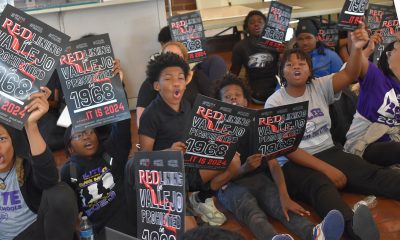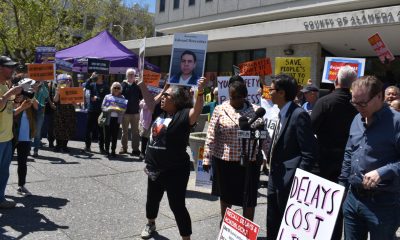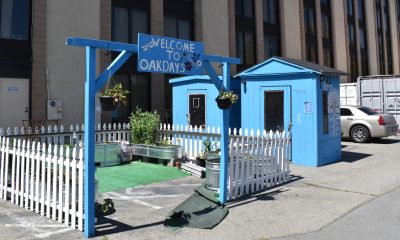Activism
California Reparations Task Force Looks at Long History of Racism in American Agriculture
In March, the U.S. Congress passed a $4 billion debt relief program for farmers of color to address past discrimination in USDA programs. The debt relief program was passed as part of the ARP. It includes funding to pay off USDA loans held by 16,000 Black, Native American, Alaskan Native, Asian American, Pacific Islander, and Hispanic and Latino farmers.

By Antonio Ray Harvey | California Black Media
Last month, Lawrence Lucas, founder of the United States Department of Agriculture Coalition of Minority Employees (USDA-CME), testified before the California Task Force to Study and Develop Reparation Proposals for African Americans.
Lucas said racism is the prime reason there are just a little over 400 Black farmers in California.
“The income of Black Farmers has been drastically reduced and the amount of wealth that has been taken from Black farmers is tremendous,” Lucas said. “What you would call reparations, we call justice. It is why you must do what you have to do in California to right the wrongs suffered by Black people.”
Lucas is not the only one concerned about mounting evidence that documents a long history of race-based discrimination in American agriculture.
The United States Department of Agriculture recently created the Equity Commission (EC) to study racial discrimination and government policies that have disempowered Black farmers, depleted their wealth and nearly wiped out their presence for over 100 years.
EC will advise the Secretary of Agriculture by identifying USDA programs, policies, systems, structures, and practices that created barriers to inclusion or perpetuated racial, economic, health and social disparities.
USDA-CME was founded in 1994 to address discrimination within the USDA, which Lucas referred to as the “Last Plantation” during his testimony. The coalition also focuses its work on the historical loss of Black-owned land and how government policies deprived African Americans of generational wealth.
The EC is expected to issue a preliminary report and provide “actionable recommendations” within the next 12 months, and a final report to be finished within two years.
“The Equity Commission is taking important steps to dismantle barriers historically underserved communities have faced in accessing USDA programs and services,” said U.S. Agriculture Secretary Tom Vilsack in a statement issued on September 24.
Lucas said despite the USDA’s efforts to address decades-old discrimination practices, he does not see it “getting any better” for Black farmers. Non-Black farm producers are fighting back in the courts, Lucas said.
“You have white farmers, who own most of the land and get all the benefits from the land; they are the ones now bringing court cases around the country. They are saying that it’s discriminatory to have debt-relief for Black farmers,” Lucas said.
The CME’s biggest accomplishment is its involvement in securing debt relief for Black farmers as part of the American Rescue Plan (ARP). The ARP package included a multi-billion-dollar fund for socially disadvantaged farmers throughout the United States.
The coalition has worked alongside U.S. Senators Elizabeth Warren (D-MA) and Cory Booker (D-NJ) to create the Justice for Black Farmers Act, which will provide even more aid to socially disadvantaged farmers.
Of the approximately 70,000 farms in California, more than 90% are white-owned or white-managed and fewer than 1% are Black-owned or Black-managed, according to the 2017 federal agriculture census.
The 2012 census reported that California had 722 Black farmers. By 2017, that number had decreased to 429. Nationally, there are 45,508 Black farmers or 1.3% of all farmers according to the 2017 agriculture census. Their properties account for 0.5% of the country’s farmlands.
In contrast, about 14% of all U.S. farmers in 1920 were Black, according to that year’s agriculture census. At the time, there were 925,708 Black farmers. Nearly all of them farmed in Deep South states. Lucas blames the USDA for the depletion of Black farmlands over the last century.
However, the USDA says it is in the process of reversing harmful policies and taking restorative action for programs that affected the progress, financial stability, and productive livelihood of Black farmers.
“We are serious about our efforts to end discrimination across all areas of the Department and to improve access to services for key stakeholders,” said USDA Deputy Secretary Jewel Bronaugh in a statement.
In March, the U.S. Congress passed a $4 billion debt relief program for farmers of color to address past discrimination in USDA programs.
The debt relief program was passed as part of the ARP. It includes funding to pay off USDA loans held by 16,000 Black, Native American, Alaskan Native, Asian American, Pacific Islander, and Hispanic and Latino farmers.
Claiming discrimination, a group of white farmers have filed a dozen lawsuits against the program including one class action suit. Preliminary injunctions by three courts have momentarily blocked the program from issuing funds from the program.
According to Khubaka Michael Harris of the California Black Farmers and Agriculturalists Association (CBFAA), “The debt relief was written in a way to help Black folks, but it is not just for Black folks. That’s why it’s in the courts. It was written where anybody who is a farmer can say, ‘Hey, I’ve been affected by COVID, too.’ Then, you are going to say that this money is just earmarked for Black folks? Now, the legislators have to go back to write in a language that targets underserved communities.”
Based in Sacramento, CBFAA advocates for socially disadvantaged California Black farmers, and agriculturalists of color nationwide.
Lucas said it is actions such as the lawsuits that “deny Black farmers their dignity,” “a right to farm,” and deny Black farmers the “right to the same programs and services that white farmers get in this country.”
In California, farming is classified under the term “agricultural activity.”
The state defines it as “the harvesting of any agricultural commodity, including timber, viticulture, apiculture, or horticulture, the raising of livestock, fur-bearing animals, fish, or poultry, and any practices performed by a farmer or on a farm are also agricultural activities.”
“That goes for licensed cannabis farmers, too,” Harris said. “If you cultivate cannabis you are a farmer in this state.”
Assembly Bill (AB) 3121, titled “The Task Force to Study and Develop Reparation Proposals for African Americans,” was a law created to investigate the history of slavery in the United States, the extent of California’s involvement in slavery, segregation, and the denial of Black citizens their constitutional rights.
The nine-member task force is expected to hear more testimonies from Black farmers in California, including producers from the Central Valley.
“I see what all of you in California are doing is what needs to be done across this country,” Lucas said during his testimony. “It is the courage of your governor and the courage of the people on this Reparation Committee to take on this daunting task of talking to other people about their pain and suffering. Black farmers are suffering.”
Activism
S.F. Black Leaders Rally to Protest, Discuss ‘Epidemic’ of Racial Slurs Against Black Students in SF Public School System
Parents at the meeting spoke of their children as no longer feeling safe in school because of bullying and discrimination. Parents also said that reported incidents such as racial slurs and intimidation are not dealt with to their satisfaction and feel ignored.

By Carla Thomas
San Francisco’s Third Baptist Church hosted a rally and meeting Sunday to discuss hatred toward African American students of the San Francisco Unified School District (SFUSD).
Rev. Amos C. Brown, president of the San Francisco NAACP and pastor of Third Baptist Church, along with leadership from local civil rights groups, the city’s faith-based community and Black community leadership convened at the church.
“There has been an epidemic of racial slurs and mistreatment of Black children in our public schools in the city,” said Brown. “This will not be tolerated.”
According to civil rights advocate Mattie Scott, students from elementary to high school have reported an extraordinary amount of racial slurs directed at them.
“There is a surge of overt racism in the schools, and our children should not be subjected to this,” said Scott. “Students are in school to learn, develop, and grow, not be hated on,” said Scott. “The parents of the children feel they have not received the support necessary to protect their children.”
Attendees were briefed last Friday in a meeting with SFUSD Superintendent Dr. Matt Wayne.
SFUSD states that their policies protect children and they are not at liberty to publicly discuss the issues to protect the children’s privacy.
Parents at the meeting spoke of their children as no longer feeling safe in school because of bullying and discrimination. Parents also said that reported incidents such as racial slurs and intimidation are not dealt with to their satisfaction and feel ignored.
Some parents said they have removed their students from school while other parents and community leaders called on the removal of the SFUSD superintendent, the firing of certain school principals and the need for more supportive school board members.
Community advocates discussed boycotting the schools and creating Freedom Schools led by Black leaders and educators, reassuring parents that their child’s wellbeing and education are the highest priority and youth are not to be disrupted by racism or policies that don’t support them.
Virginia Marshall, chair of the San Francisco NAACP’s education committee, offered encouragement to the parents and students in attendance while also announcing an upcoming May 14 school board meeting to demand accountability over their mistreatment.
“I’m urging anyone that cares about our students to pack the May 14 school board meeting,” said Marshall.
This resource was supported in whole or in part by funding provided by the State of California, administered by the California State Library via California Black Media as part of the Stop the Hate Program. The program is supported by partnership with California Department of Social Services and the California Commission on Asian and Pacific Islander American Affairs as part of the Stop the Hate program. To report a hate incident or hate crime and get support, go to CA vs Hate.
Activism
Oakland Ambassadors Strengthen Ties and Aid Efforts in Ghana
Oakland natives and esteemed members of the African American Sports and Entertainment Group (AASEG), Jonathan P. Jones and Dr. Maritony Efua Jones, recently embarked on a significant journey to Ghana as guests of the World Martial Authority Ghana. This trip signifies a crucial opportunity to bolster partnerships, explore new avenues of collaboration, and contribute to impactful initiatives in Ghana.
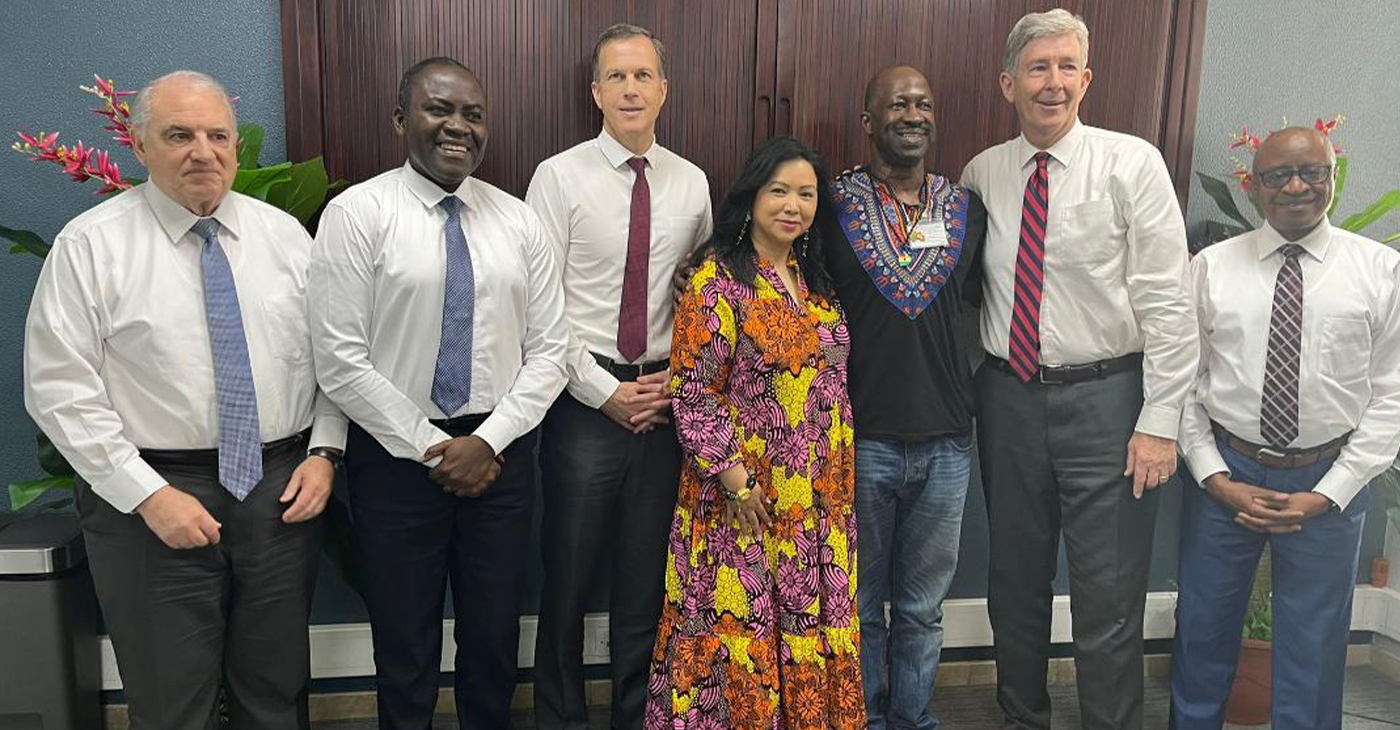
By Post Staff
Oakland natives and esteemed members of the African American Sports and Entertainment Group (AASEG), Jonathan P. Jones and Dr. Maritony Efua Jones, recently embarked on a significant journey to Ghana as guests of the World Martial Authority Ghana.
This trip signifies a crucial opportunity to bolster partnerships, explore new avenues of collaboration, and contribute to impactful initiatives in Ghana.
Upon their arrival at Katota Airport in Accra, Ghana, the Joneses were warmly received by His Royal Majesty Okatakyie Asafo Boakye III, the distinguished king of Sanzule Kingdom in the Eastern Nzema, and Etse Nyamedi of World Martial Authority, Ghana.
Nyamedi accompanied the Joneses to the city of Mepe, which had recently experienced flooding, to assess damages and engage with local leaders, elders, and youth regarding the city’s urgent needs after major floods last fall.
Key concerns and priorities identified by the community include comprehensive flood mitigation measures, agricultural support, housing initiatives, educational enhancements, improved healthcare access, and the development of communal recreational spaces.
The Joneses were also graciously invited to meet with leaders of The Church of Jesus Christ of Latter-day Saints at their headquarters in Accra. This meeting provided insights into ongoing humanitarian efforts in Ghana and explored avenues for collaboration to further assist Ghanaian communities.
The LDS leaders shared their prompt response to the recent flood, demonstrating their commitment to humanitarian aid by dispatching substantial supplies including medical provisions, sanitation items, blankets, and food to assist flood victims just four days after the disaster.
Additionally, Boakye extended a special invitation to the Joneses to his palace, where they were pleasantly surprised with a heartfelt recognition ceremony. Maritony Jones was honored as the Queen Mother of the Sanzule Kingdom in acknowledgment of her dedicated work, while Jonathan Jones was lauded and welcomed as the ambassador of the Sanzule Kingdom, symbolizing a meaningful homecoming to their ancestral land.
The visit not only strengthens ties between Oakland and Ghana but also underscores the collaborative spirit and commitment to meaningful progress and humanitarian endeavors shared by all involved parties.
Activism
Calif. Anti-Sex Trafficking Advocates Discuss Competing Bills, Strategies
Advocates from across California are challenging state officials and community leaders to support legislation that provides resources and services for survivors and victims of human trafficking, as well as assistance as they transition back into civil society. Some of those advocates are also calling for more effective state policy to curtail trafficking, a crime that has an outsized impact on Black children, particularly girls.
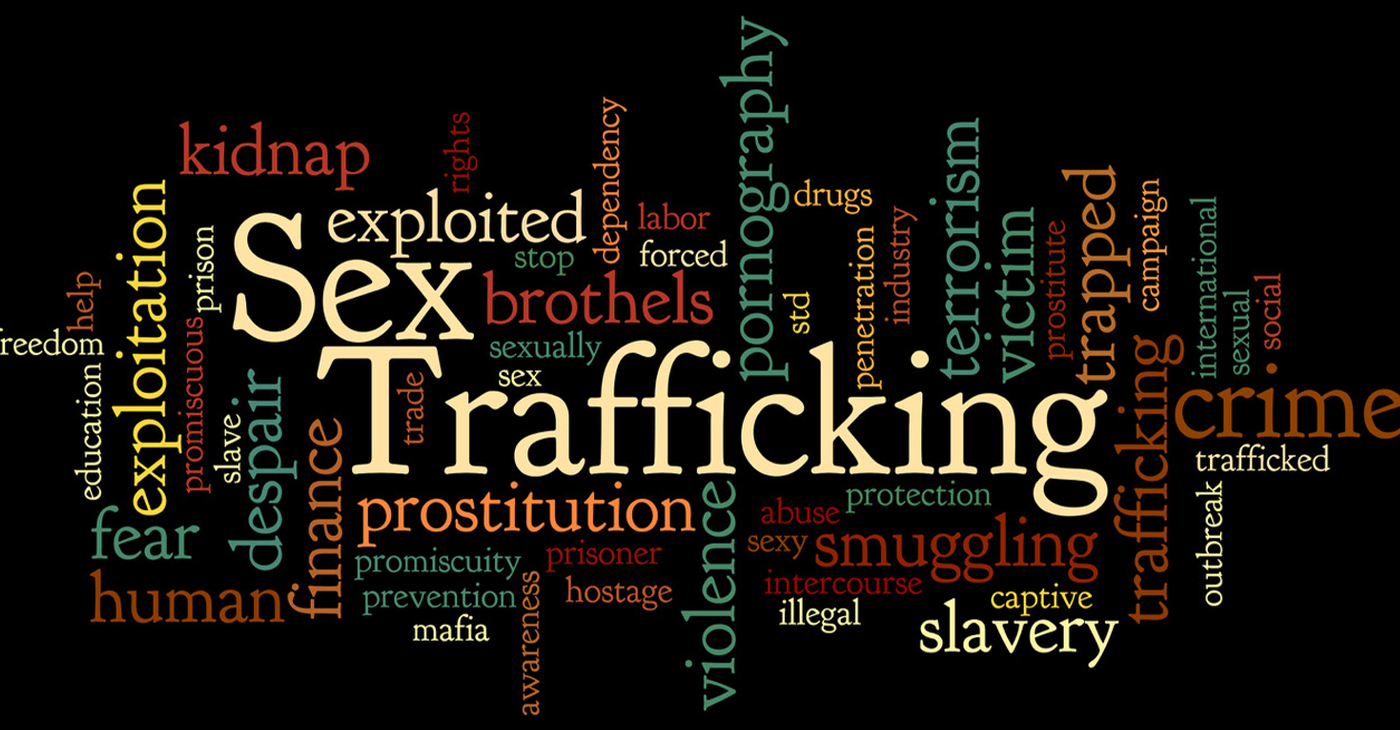
By Bo Tefu, California Black Media
Advocates from across California are challenging state officials and community leaders to support legislation that provides resources and services for survivors and victims of human trafficking, as well as assistance as they transition back into civil society.
Some of those advocates are also calling for more effective state policy to curtail trafficking, a crime that has an outsized impact on Black children, particularly girls.
According to the FBI, a report covering a two-year period found Black children accounted for 57% of all juvenile arrests for prostitution. In addition, 40% of sex trafficking victims were Black and 60% of those victims had been enrolled in the foster care system.
“It is time to hold the perpetrators who take advantage of our children accountable,” said the Rev. Shane Harris, a San Diego-based activist, former foster youth and founder of the Peoples Association of Justice Advocates, (PAJA), a national civil rights organization and policy think tank.
“It is time to send a thorough message that if you seek to buy a child for sex, you will pay the highest criminal penalties in this state,” added Harris who was speaking at a rally at the State Capitol earlier this month. Harris was speaking in support of Senate Bill 1414, authored by Sen. Shannon Grove (D-Bakersfield), which calls for people who buy sex from minors to be punished with a felony. The punishment includes a two-year prison sentence and a $25,000 fine.
Harris said the PAJA is the only civil rights organization in the state that supports SB 1414.
Harris urged other Black-led groups who favor anti-trafficking legislation more focused on criminal justice reforms (as opposed to stiffer penalties), to “join the movement.”
Many of those civil rights groups fear that SB 1414 could lead to the incarceration of more Black youth.
Those sentiments were echoed in a panel discussion organized by Black women advocates on April 26 to examine the cause and effects of human trafficking in California’s Black communities. The virtual event was hosted by the Forgotten Children, Inc, a faith-based nonprofit that advocates for survivors and victims of human trafficking through anti-trafficking campaigns and initiatives.
Panelists shared the psychological impact of sexual exploitation on youth and children in the long term.
Author and educator Dr. Stephany Powell shared statistics and information revealing that African American women and girls are the most trafficked nationwide.
Powell, who serves as the senior advisor on law enforcement and policy at the National Center on Sexual Exploitation said that national data indicates that sex trade survivors are disproportionately women of color. She stated that male survivors often go unnoticed because boys rarely report trafficked crimes.
Powell said that decriminalizing prostitution in California could increase human trafficking. She argued that Senate Bill 357, authored by Sen. Scott Wiener (D-San Francisco), which was signed into law in 2022 and legalized loitering for prostitution, caused a surge in street-level prostitution.
Panelist and psychologist Dr. Gloria Morrow shared opposing views on decriminalizing prostitution. She said that decriminalizing prostitution could help survivors gain access to state resources and support.
Despite opposing views, Powell and Morrow agree that the Black community needs resources and educational programs to address human trafficking.
-

 Community3 weeks ago
Community3 weeks agoFinancial Assistance Bill for Descendants of Enslaved Persons to Help Them Purchase, Own, or Maintain a Home
-

 Business3 weeks ago
Business3 weeks agoV.P. Kamala Harris: Americans With Criminal Records Will Soon Be Eligible for SBA Loans
-

 Activism4 weeks ago
Activism4 weeks agoOakland Post: Week of April 10 – 16, 2024
-

 Community3 weeks ago
Community3 weeks agoAG Bonta Says Oakland School Leaders Should Comply with State Laws to Avoid ‘Disparate Harm’ When Closing or Merging Schools
-

 Activism2 weeks ago
Activism2 weeks agoOakland Post: Week of April 24 – 30, 2024
-

 City Government3 days ago
City Government3 days agoCourt Throws Out Law That Allowed Californians to Build Duplexes, Triplexes and RDUs on Their Properties
-

 Community2 weeks ago
Community2 weeks agoRichmond Nonprofit Helps Ex-Felons Get Back on Their Feet
-

 Community2 weeks ago
Community2 weeks agoOakland WNBA Player to be Inducted Into Hall of Fame

